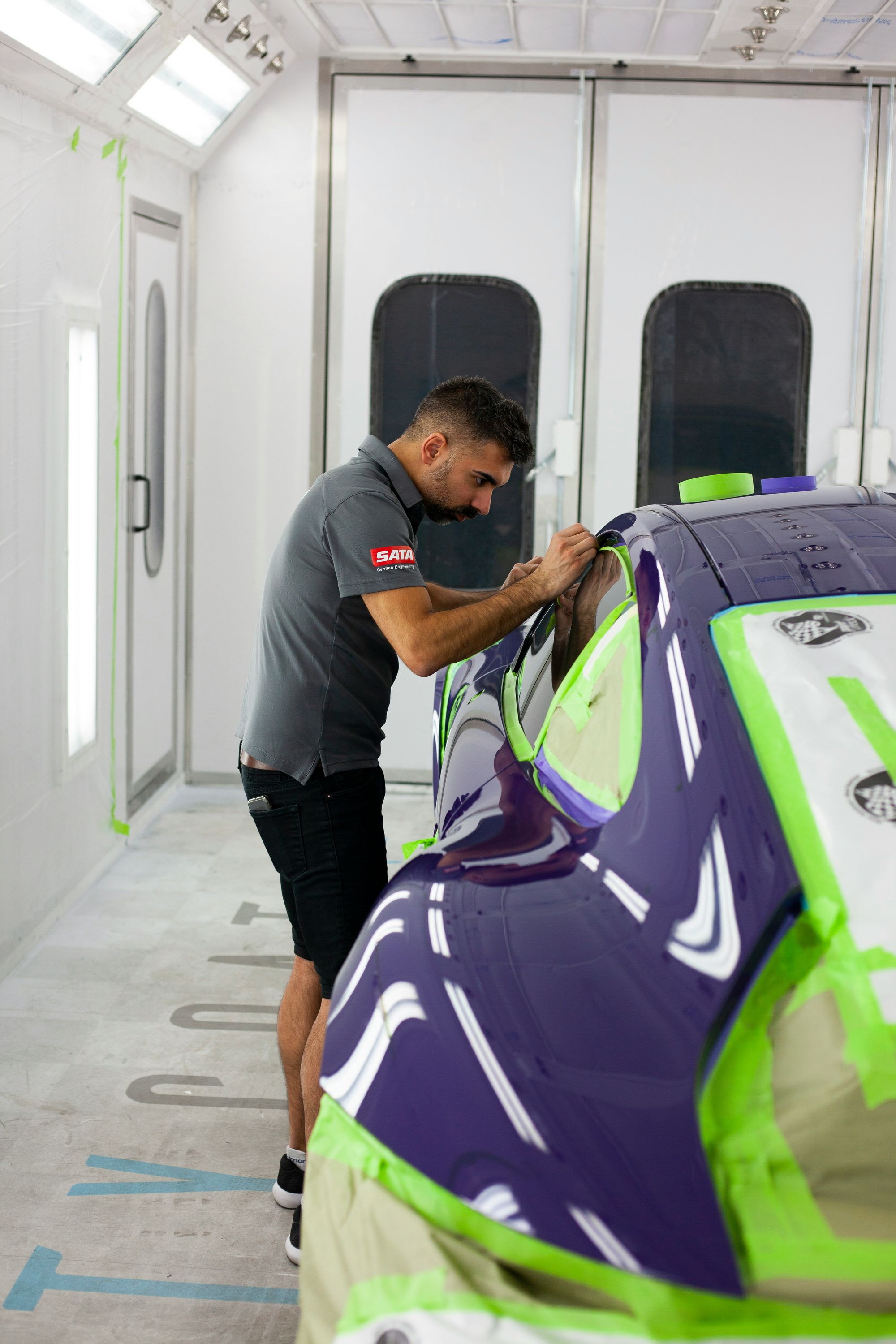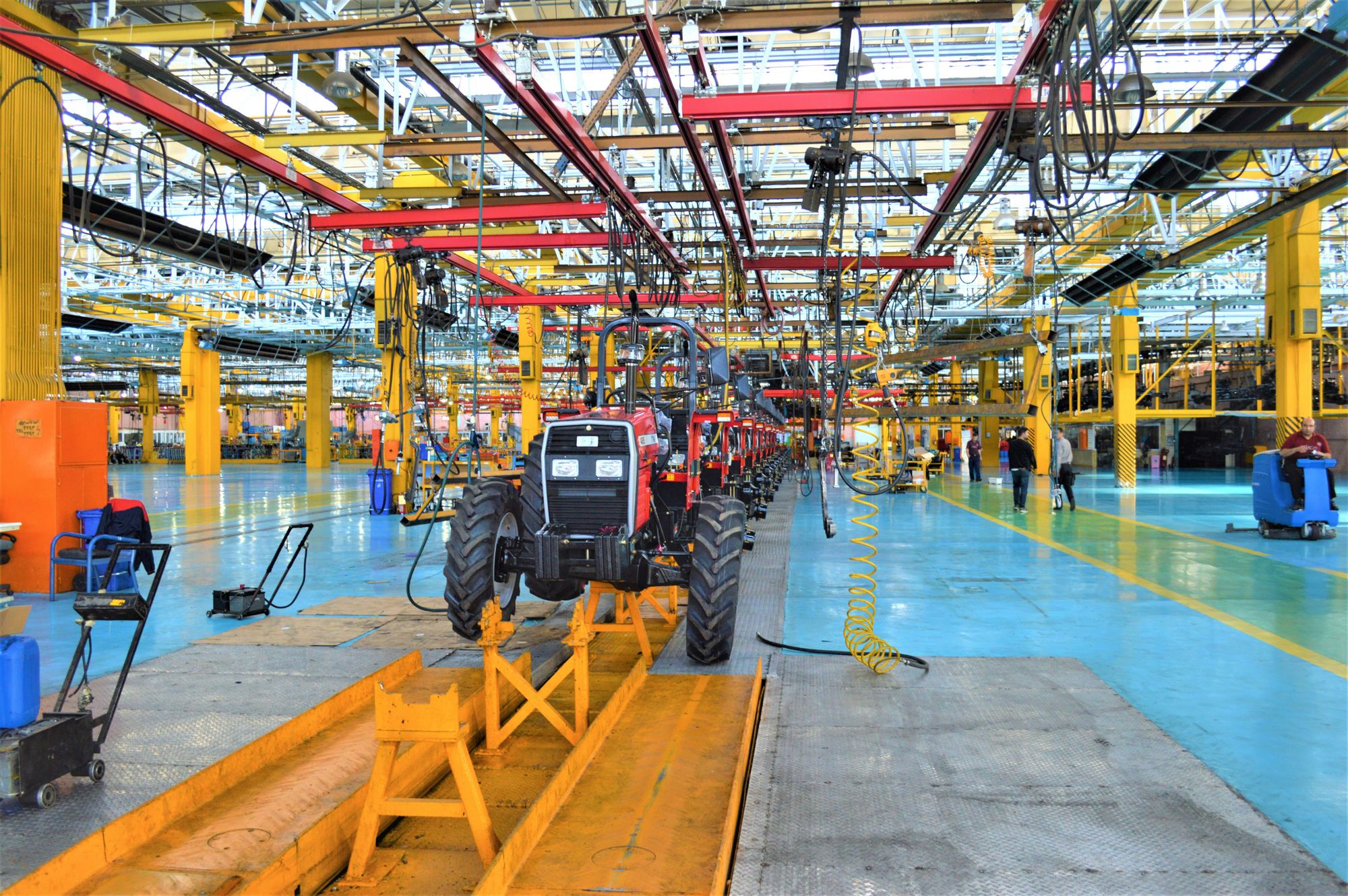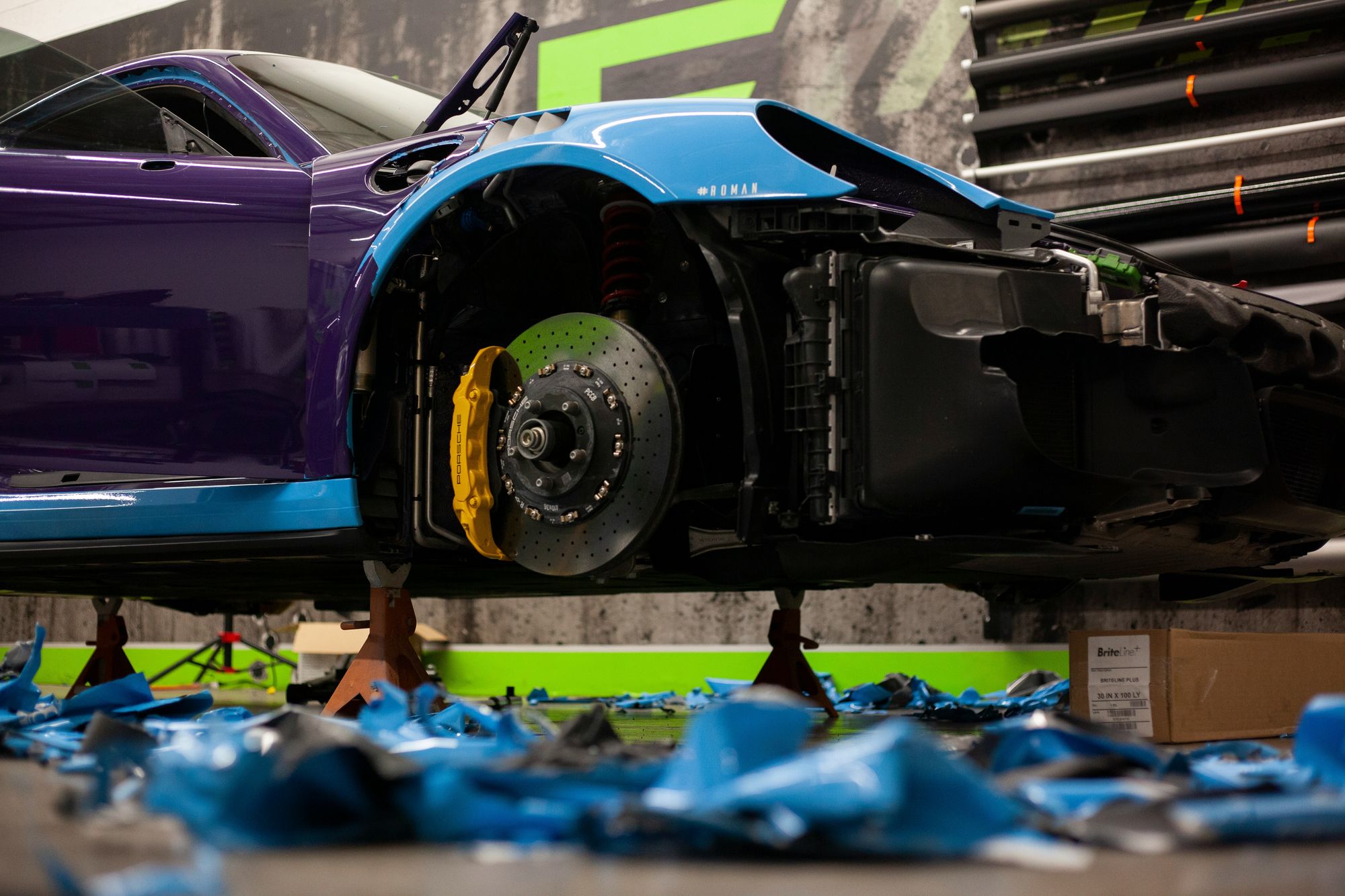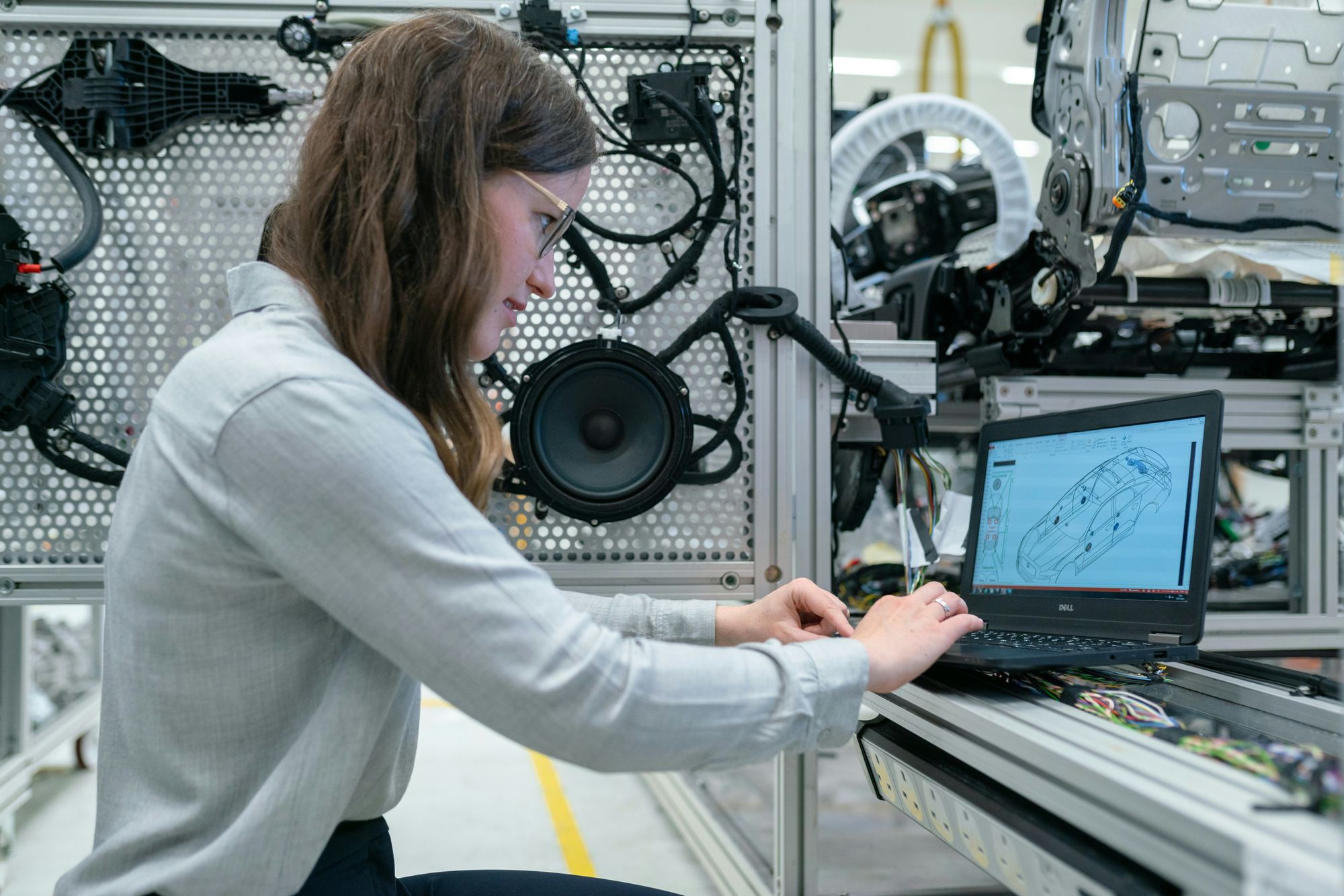Are you wondering which would be a better choice for your business - automotive ERP or traditional management systems? If your answer to this question is yes, then you are on the right page.
In the ever-evolving landscape of the automotive industry, the efficiency and effectiveness of management systems play a pivotal role in determining the success and sustainability of organizations.
As automotive companies strive to streamline operations, enhance productivity, and stay ahead of the competition, they face the critical decision of choosing between automotive ERP (Enterprise Resource Planning) and traditional management systems to manage their business processes.
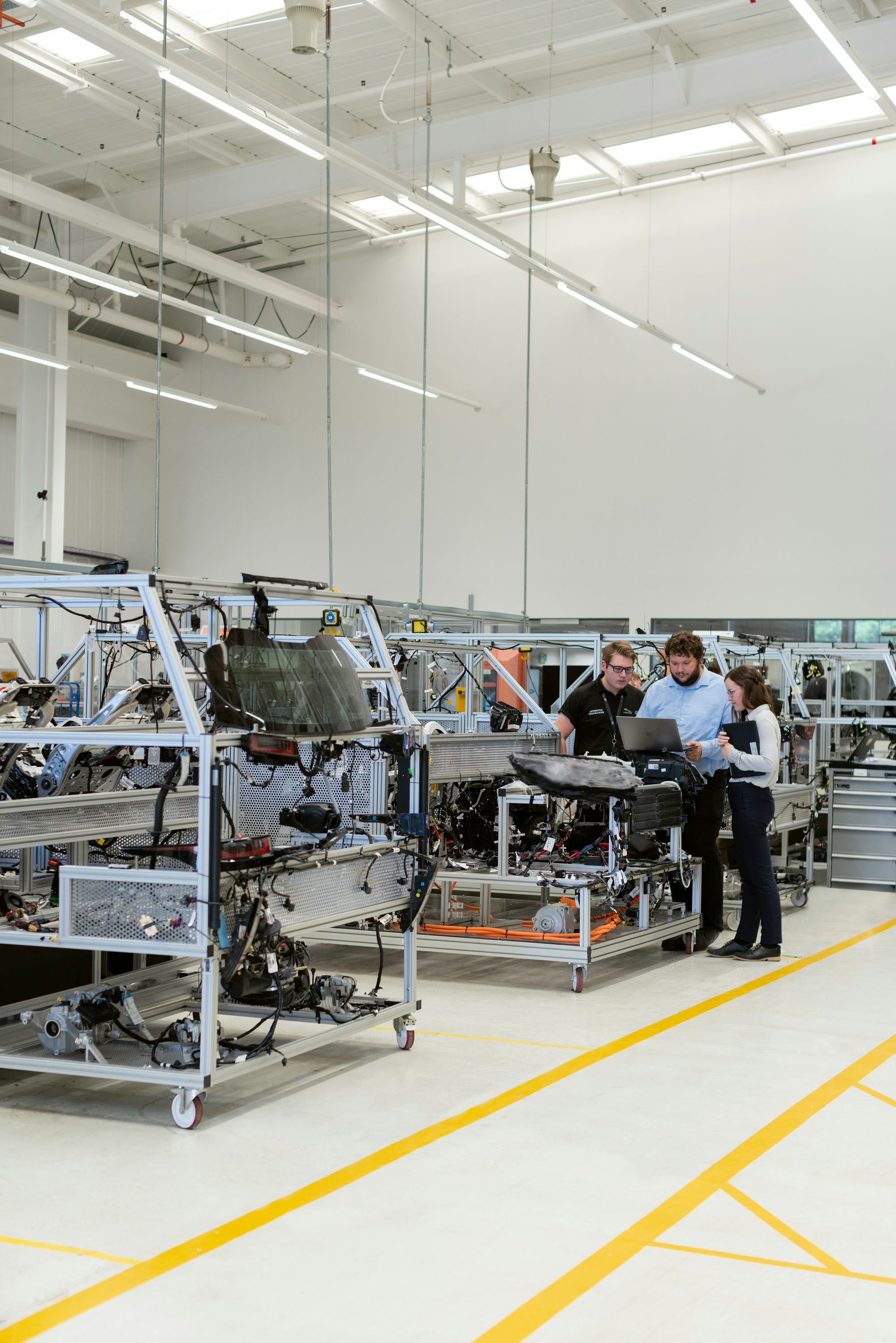
Automotive ERP represents a modern approach to management, offering integrated, industry-specific solutions designed to meet the complex demands of automotive manufacturing, supply chain management, and customer relations. In contrast, traditional management systems encompass conventional methods, often relying on standalone software applications or manual processes to address specific business functions.
This comparative analysis delves into the key differences between automotive ERP and traditional management systems, exploring their respective features, functionalities, benefits, and limitations.
By examining these two approaches side by side, automotive professionals can gain valuable insights into the factors influencing their management system choices and their implications for organizational efficiency, competitiveness, and growth.
The topics covered in this article are:
- What is ERP?
- What is Automotive ERP?
- What are Traditional Management Systems?
- Automotive ERP vs. Traditional Management Systems: A Comparative Analysis
- FAQs related to Automotive ERP vs. Traditional Management Systems
- How can Deskera as an Automotive ERP Help the Automotive Industry?
- Key Takeaways
- Related Articles
What is ERP?
Enterprise Resource Planning (ERP) is a comprehensive software system designed to streamline and integrate business processes and functions across an entire organization. It serves as a centralized platform that allows companies to manage and automate various core functions, including accounting, finance, human resources, supply chain management, manufacturing, customer relationship management (CRM), and more.
The primary goal of ERP is to facilitate the flow of information and data between different departments and functions within an organization, enabling seamless communication, collaboration, and decision-making. By consolidating data and processes into a single, unified system, ERP eliminates data silos, reduces manual work, and provides real-time visibility into business operations.
What is Automotive ERP?
Automotive ERP (Enterprise Resource Planning) is a specialized software solution tailored to meet the unique needs and challenges of the automotive industry. It serves as a centralized platform that integrates and manages various business functions and processes across the automotive value chain, including manufacturing, supply chain management, finance, sales, and customer service.
Overall, automotive ERP is a powerful tool for automotive companies to optimize operations, drive innovation, and enhance competitiveness in a rapidly evolving industry landscape. It enables organizations to streamline processes, improve decision-making, and achieve sustainable growth by providing integrated, scalable, and industry-specific solutions.
What are Traditional Management Systems?
A traditional management system refers to conventional methods or software solutions used by organizations to manage various aspects of their operations, such as manufacturing, supply chain, finance, human resources, and customer relationship management.
Traditional management systems are characterized by their fragmented nature, limited integration, functional focus, and reliance on manual processes. While these systems may have served organizations well in the past, they may struggle to meet the demands of modern businesses seeking integrated, scalable, and agile solutions to drive operational excellence and competitive advantage.
Automotive ERP vs. Traditional Management Systems: A Comparative Analysis
Enterprise Resource Planning (ERP) systems have become integral in managing various aspects of business operations, including those in the automotive industry. Traditional management systems, on the other hand, may refer to legacy systems or standalone software that address specific functions within a company.
Let's compare automotive ERP and traditional management systems in the context of the automotive industry:
Integration and Centralization
In the realm of automotive operations, the efficiency and effectiveness of managing diverse processes like manufacturing, supply chain logistics, finance, and more are paramount.
This necessitates a robust system that seamlessly integrates and centralizes data from various departments, ensuring smooth operations and informed decision-making.
Let's delve deeper into how automotive ERP differs from traditional management systems in terms of integration and centralization.
Automotive ERP: Streamlining Operations Through Integration
Automotive ERP software stands as a comprehensive solution designed explicitly for the automotive industry's complex needs. It amalgamates diverse functions such as production planning, inventory management, procurement, and customer relationship management into a unified platform.
This integration facilitates real-time data exchange across departments, fostering agility and responsiveness in addressing market demands and operational challenges.
With automotive ERP, manufacturers and suppliers can optimize resource allocation, streamline workflows, and enhance productivity across the value chain.
The centralization offered by automotive ERP software ensures that stakeholders access a single source of truth for critical information, eliminating data silos and redundancies.
Whether it's tracking raw material inventory levels, monitoring production schedules, or analyzing sales trends, automotive ERP provides a holistic view of the entire business landscape.
This centralized approach enhances collaboration, as teams collaborate seamlessly on projects, share insights, and align strategies to drive organizational growth.
Traditional Management Systems: Fragmented Solutions with Limited Integration
In contrast, traditional management systems often entail a fragmented approach, where disparate software applications cater to specific functions or departments within an automotive enterprise.
While these systems may suffice for isolated tasks like inventory management or accounting, they lack the overarching integration capabilities of automotive ERP software. This fragmented setup leads to data silos, wherein crucial information remains compartmentalized, hindering cross-functional visibility and decision-making.
Traditional management systems may involve manual data entry and reconciliation processes, leading to inefficiencies, errors, and delays.
Moreover, integrating data from multiple standalone systems becomes a daunting challenge, requiring extensive manual effort and increasing the likelihood of inaccuracies.
Consequently, automotive businesses relying on traditional management systems may encounter operational bottlenecks, hampering their ability to adapt swiftly to market dynamics and capitalize on emerging opportunities.
Conclusion: Unlocking Operational Excellence with Automotive ERP
In summary, the choice between automotive ERP and traditional management systems boils down to the fundamental need for integration and centralization.
While traditional systems offer piecemeal solutions, automotive ERP software empowers automotive enterprises with a unified platform that harmonizes processes, fosters collaboration, and drives innovation.
By embracing automotive ERP, organizations can navigate the complexities of the automotive industry with agility, efficiency, and resilience, gaining a competitive edge in today's dynamic marketplace.
Functionality and Scope
In the automotive industry, where intricate processes intertwine to drive production, supply chain management, and customer satisfaction, the choice of management software can significantly impact operational efficiency and business success.
Let's explore how automotive ERP differs from traditional management systems in terms of functionality and scope.
Automotive ERP: Comprehensive Solutions Tailored for Industry Needs
Automotive ERP software emerges as a comprehensive suite of solutions meticulously crafted to address the multifaceted requirements of automotive manufacturers and suppliers.
From managing complex production workflows to orchestrating seamless supply chain operations, automotive ERP encompasses a broad spectrum of functionalities essential for driving operational excellence and fostering innovation.
With automotive ERP, organizations gain access to an array of modules spanning product lifecycle management, material requirements planning, demand forecasting, and quality control.
This expansive scope empowers stakeholders to oversee every facet of the automotive value chain, from design and engineering to manufacturing and distribution.
Moreover, automotive ERP software often incorporates specialized features like advanced analytics, predictive maintenance, and regulatory compliance tools, enabling businesses to stay ahead of the curve in a dynamic industry landscape.
Traditional Management Systems: Limited Functionality with Narrow Focus
In contrast, Traditional Management Systems typically offer narrower functionality, focusing on specific tasks or departments within an automotive enterprise.
While these systems may excel in addressing isolated needs such as inventory management, accounting, or customer relationship management, they often lack the breadth and depth of features found in automotive ERP software.
Traditional management systems may require integration with multiple third-party applications to achieve comparable functionality to automotive ERP.
However, this piecemeal approach introduces complexities associated with disparate systems, data fragmentation, and interoperability challenges.
As a result, automotive businesses relying solely on traditional management systems may struggle to attain the holistic view of operations necessary for driving strategic decision-making and sustainable growth.
Conclusion: Empowering Automotive Enterprises with Versatile Solutions
In the competitive landscape of the automotive industry, where innovation and efficiency reign supreme, the choice between automotive ERP and traditional management systems can make all the difference.
By embracing automotive ERP software, organizations unlock a wealth of capabilities encompassing the entire spectrum of automotive operations, from design and manufacturing to distribution and customer service.
With its expansive functionality and scope, automotive ERP enables businesses to streamline processes, optimize resource allocation, and capitalize on emerging opportunities in a rapidly evolving market.
By leveraging the power of automotive ERP, enterprises can navigate industry challenges with confidence, drive continuous improvement, and position themselves for long-term success in the dynamic automotive ecosystem.
Data Accuracy and Real-Time Information
In the fast-paced automotive industry, accurate data and real-time insights are indispensable for making informed decisions and maintaining a competitive edge.
Let's delve into how automotive ERP diverges from traditional management systems concerning data accuracy and real-time information.
Automotive ERP: Precision and Timeliness Integrated
Automotive ERP software serves as a hub for data accuracy and real-time information dissemination across various operational domains. By consolidating data from disparate sources into a unified platform, automotive ERP ensures a single source of truth, eliminating discrepancies and fostering confidence in decision-making processes.
Real-time data updates within automotive ERP enable stakeholders to monitor key performance indicators (KPIs) instantaneously, whether it's production line efficiency, inventory levels, or supply chain disruptions.
This real-time visibility empowers automotive enterprises to proactively address challenges, seize opportunities, and adapt swiftly to changing market dynamics.
Moreover, automotive ERP's robust data validation mechanisms and built-in error detection algorithms enhance data accuracy, mitigating the risk of costly errors and compliance breaches.
By adhering to stringent data integrity standards, automotive ERP software instills trust in the reliability of operational data, underpinning strategic initiatives and fostering a culture of continuous improvement.
Traditional Management Systems: Potential for Data Lag and Inconsistencies
In contrast, Traditional Management Systems may fall short in delivering real-time information and ensuring data accuracy due to their fragmented nature and reliance on manual data entry processes.
Siloed systems catering to specific functions or departments can lead to data lag and inconsistencies, hindering timely decision-making and compromising operational efficiency.
Without real-time updates and integration capabilities, traditional management systems may struggle to provide a holistic view of operations, leaving stakeholders in the dark about critical developments and performance metrics.
This lack of visibility can impede responsiveness to market shifts, jeopardize customer satisfaction, and erode competitive advantage in the fiercely competitive automotive landscape.
Furthermore, the manual nature of data entry and reconciliation in traditional systems increases the likelihood of human errors, data duplication, and inaccuracies.
These data integrity issues not only undermine confidence in decision-making but also entail additional time and resources for error correction and data cleansing efforts.
Conclusion: Empowering Decision-Making with Automotive ERP
In today's data-driven automotive industry, the choice between automotive ERP and traditional management systems can have far-reaching implications for organizational agility and competitiveness.
By embracing automotive ERP software, enterprises gain a strategic advantage through accurate, real-time insights that drive operational efficiency, enhance customer satisfaction, and fuel innovation.
With automotive ERP's robust data management capabilities, organizations can navigate the complexities of the automotive value chain with confidence, leveraging timely information to anticipate market trends, optimize resource allocation, and capitalize on growth opportunities.
By harnessing the power of automotive ERP, businesses position themselves for sustained success in an ever-evolving industry landscape.
Scalability and Flexibility
In the dynamic environment of the automotive industry, the ability to scale operations and adapt to changing business needs is crucial for sustained success.
Let's explore how automotive ERP diverges from traditional management systems in terms of scalability and flexibility.
Automotive ERP: Adaptable Solutions for Growth and Evolution
Automotive ERP software offers unparalleled scalability and flexibility, empowering organizations to expand operations, enter new markets, and accommodate evolving industry trends with ease.
Built on a robust architecture, automotive ERP systems are designed to grow seamlessly alongside businesses, supporting increased transaction volumes, user counts, and geographical expansion without compromising performance or reliability.
Whether scaling up production capacities, diversifying product portfolios, or integrating acquisitions, automotive ERP enables organizations to scale operations efficiently while maintaining operational coherence and data integrity.
Moreover, automotive ERP's modular architecture allows businesses to tailor the system to their specific requirements, adding or removing functionalities as needed to align with evolving business strategies and industry regulations.
Additionally, automotive ERP software facilitates seamless integration with third-party applications and emerging technologies, such as Internet of Things (IoT) devices, artificial intelligence (AI), and machine learning algorithms.
This interoperability enhances adaptability and future-proofs automotive enterprises against technological obsolescence, enabling them to leverage cutting-edge innovations to drive competitive advantage.
Traditional Management Systems: Limited Scalability and Rigidity
In contrast, traditional management systems may struggle to accommodate the scalability demands of rapidly growing automotive enterprises. These legacy systems often lack the agility and extensibility required to support increased transaction volumes, complex business processes, and diverse user requirements, leading to performance bottlenecks and system limitations.
Scaling traditional management systems typically entails significant investments in hardware upgrades, software customization, and integration efforts, prolonging implementation timelines and increasing the total cost of ownership.
Moreover, the rigidity of traditional systems may hinder organizational agility, as businesses find themselves constrained by outdated architectures and cumbersome workflows that impede innovation and responsiveness to market changes.
Furthermore, the lack of flexibility in traditional management systems may hinder seamless adaptation to evolving industry regulations, customer preferences, and competitive dynamics.
Without the ability to swiftly modify business processes or incorporate new functionalities, automotive enterprises relying on traditional systems risk falling behind competitors who leverage more agile and scalable solutions like automotive ERP.
Conclusion: Empowering Growth and Innovation with Automotive ERP
In the fiercely competitive automotive industry, the choice between automotive ERP and traditional management systems can shape an organization's ability to scale operations, drive innovation, and maintain market leadership.
By embracing automotive ERP software, businesses gain a scalable, flexible platform that evolves alongside their needs, empowering them to seize opportunities, mitigate risks, and achieve sustainable growth in a rapidly evolving marketplace.
With automotive ERP's robust scalability and flexibility, organizations can future-proof their operations, streamline processes, and unlock new avenues for value creation.
By harnessing the power of automotive ERP, automotive enterprises position themselves for success in an ever-changing industry landscape, driving efficiency, innovation, and profitability.
Cost Considerations
In the automotive industry, managing costs while maximizing operational efficiency is paramount for sustained profitability and competitiveness.
Let's explore how automotive ERP differs from traditional management systems in terms of cost considerations.
Automotive ERP: Long-term Value Proposition with Initial Investment
Automotive ERP software often requires a significant initial investment due to factors such as software licensing, implementation, training, and customization.
However, this upfront expenditure represents a strategic investment in streamlining operations, enhancing productivity, and driving business growth over the long term.
Despite the initial cost outlay, automotive ERP offers a compelling value proposition by delivering tangible benefits such as improved process efficiency, reduced lead times, optimized inventory management, and enhanced decision-making capabilities.
By consolidating disparate systems into a unified platform, automotive ERP eliminates inefficiencies, data silos, and manual errors, resulting in cost savings and operational synergies across the organization.
Moreover, automotive ERP's scalability and flexibility enable businesses to adapt to evolving market dynamics and scale operations without incurring prohibitive costs.
As the automotive enterprise grows and evolves, automotive ERP can accommodate increased transaction volumes, user counts, and functional requirements, ensuring a positive return on investment (ROI) over the software's lifecycle.
Traditional Management Systems: Lower Initial Costs with Potential Long-term Expenses
Traditional Management Systems may offer lower initial costs compared to automotive ERP, as they typically involve standalone solutions targeting specific functions or departments within the organization.
However, these apparent cost savings may be offset by hidden expenses associated with system fragmentation, integration challenges, and limited scalability.
While traditional systems may address immediate needs such as inventory management, accounting, or customer relationship management at a lower upfront cost, they often lack the comprehensive functionality and integration capabilities of automotive ERP.
Over time, businesses relying solely on traditional management systems may encounter escalating costs related to software maintenance, upgrades, customization, and integration efforts.
Additionally, the lack of scalability inherent in traditional systems may necessitate costly investments in hardware upgrades, software enhancements, and third-party integrations to support business growth and evolving requirements.
Without the ability to adapt swiftly to changing market conditions or integrate seamlessly with emerging technologies, automotive enterprises may find themselves saddled with escalating costs and diminishing ROI from traditional management systems.
Conclusion: Maximizing Value and Efficiency with Automotive ERP
In the competitive landscape of the automotive industry, the choice between automotive ERP and traditional management systems hinges on balancing upfront costs with long-term value and efficiency gains.
While automotive ERP may entail a higher initial investment, its comprehensive functionality, integration capabilities, scalability, and flexibility offer a compelling value proposition that drives operational excellence and sustainable growth.
By embracing automotive ERP software, automotive enterprises can optimize their cost structure, streamline processes, mitigate risks, and capitalize on emerging opportunities in a rapidly evolving market.
With automotive ERP as a strategic enabler, organizations can achieve cost efficiencies, enhance competitiveness, and position themselves for success in the dynamic automotive ecosystem.
User Experience and Accessibility
In the automotive industry, where efficiency and productivity are paramount, the user experience and accessibility of management software play a crucial role in driving operational effectiveness.
Let's delve into how automotive ERP differs from traditional management systems in terms of user experience and accessibility.
Automotive ERP: Unified Experience for Enhanced Productivity
Automotive ERP software offers a unified and intuitive user experience designed to streamline workflows, enhance collaboration, and boost productivity across the organization.
With a cohesive interface encompassing all core functions from manufacturing and supply chain management to finance and customer relationship management, automotive ERP ensures a seamless and consistent user experience for all stakeholders.
The accessibility of automotive ERP extends beyond the confines of the office, with many modern solutions offering mobile and cloud-based capabilities.
This enables users to access critical data, monitor operations, and collaborate with team members from anywhere, at any time, using a variety of devices such as smartphones, tablets, and laptops.
By facilitating remote access and real-time information sharing, automotive ERP empowers employees to make informed decisions and respond swiftly to business needs, regardless of their location.
Moreover, automotive ERP systems often incorporate features such as role-based access controls, customizable dashboards, and personalized notifications, enabling users to tailor the software to their specific preferences and responsibilities.
This enhances user engagement, satisfaction, and adoption rates, driving higher levels of efficiency and effectiveness throughout the organization.
Traditional Management Systems: Fragmented Experience with Limited Accessibility
In contrast, traditional management systems may offer a fragmented user experience characterized by disparate interfaces, standalone applications, and manual data entry processes.
Users may need to navigate through multiple systems to perform different tasks, leading to inefficiencies, cognitive overload, and reduced productivity.
Accessibility can also be a challenge with traditional management systems, particularly for remote or field-based employees who require access to real-time information while on the go.
Without mobile or cloud-based capabilities, users may face limitations in accessing critical data or collaborating with colleagues outside the office, hindering responsiveness and agility in decision-making.
Furthermore, the lack of customization options and user-friendly features in traditional systems may contribute to user frustration and resistance to adoption.
Cumbersome workflows, outdated interfaces, and limited support for modern collaboration tools can impede user satisfaction and undermine the overall effectiveness of the software.
Conclusion: Empowering Users with Automotive ERP
In the era of digital transformation, the user experience and accessibility of management software are critical drivers of organizational success.
By embracing automotive ERP software, automotive enterprises can provide their users with a unified, intuitive, and accessible platform that enhances productivity, collaboration, and decision-making across the organization.
With its mobile-friendly interface, customizable features, and real-time data access, automotive ERP empowers users to work more efficiently, whether they're on the factory floor, in the field, or at their desks.
By optimizing the user experience and accessibility of management software, automotive enterprises can unlock the full potential of their workforce, drive operational excellence, and stay ahead in a competitive marketplace.
Compliance and Regulation
Navigating the intricate web of regulatory requirements and compliance standards is essential for automotive enterprises to ensure legal adherence, mitigate risks, and maintain stakeholder trust.
Let's explore how automotive ERP differs from traditional management systems in terms of compliance and regulation.
Automotive ERP: Built-in Compliance Frameworks for Regulatory Adherence
Automotive ERP software is equipped with robust compliance management features tailored to the specific regulatory landscape of the automotive industry.
These solutions incorporate built-in frameworks and functionalities designed to facilitate adherence to a myriad of regulations, standards, and industry mandates, including ISO/TS 16949, GDPR, SOX, and environmental regulations.
By centralizing compliance-related processes within the ERP system, automotive enterprises can streamline regulatory reporting, documentation, and audit trails, ensuring transparency, accuracy, and accountability across the organization.
Automated alerts and notifications within automotive ERP software help stakeholders stay informed about regulatory updates, deadlines, and compliance requirements, mitigating the risk of non-compliance penalties and legal repercussions.
Furthermore, automotive ERP systems often offer traceability and auditability features that enable businesses to track the origin, movement, and disposition of materials and products throughout the supply chain.
This visibility not only enhances compliance with product safety and traceability regulations but also facilitates rapid response to quality issues, recalls, and regulatory inquiries, safeguarding brand reputation and customer trust.
Traditional Management Systems: Fragmented Compliance Approaches with Limited Integration
In contrast, traditional management systems may adopt a fragmented approach to compliance management, relying on standalone solutions or manual processes to address specific regulatory requirements.
Without integration with a centralized ERP system, compliance-related data and documentation may reside in siloed repositories, increasing the risk of inconsistencies, inaccuracies, and oversight.
Traditional management systems may lack the built-in compliance frameworks and automation capabilities found in automotive ERP software, requiring additional investments in third-party tools, consultants, or manual resources to achieve regulatory adherence.
This piecemeal approach to compliance management can result in increased complexity, administrative burden, and compliance costs for automotive enterprises.
Moreover, the lack of real-time data integration and visibility in traditional systems may hinder proactive compliance monitoring and risk mitigation efforts.
Without timely access to compliance-related information and analytics, automotive businesses may struggle to identify emerging compliance issues, address root causes, and implement corrective actions in a timely manner, exposing the organization to regulatory fines and reputational damage.
Conclusion: Ensuring Regulatory Compliance with Automotive ERP
In the highly regulated automotive industry, compliance with legal and industry standards is non-negotiable for maintaining market access, customer confidence, and brand integrity.
By leveraging automotive ERP software, automotive enterprises can establish a robust compliance framework that integrates seamlessly with core business processes, streamlines regulatory reporting, and mitigates compliance risks.
With its centralized approach to compliance management, automated workflows, and real-time analytics, automotive ERP empowers organizations to stay ahead of evolving regulatory requirements, proactively address compliance challenges, and demonstrate adherence to stakeholders and regulatory authorities.
By embracing automotive ERP software, automotive enterprises can navigate the complexities of compliance with confidence, driving operational excellence and sustainable growth in a highly regulated environment.
Vendor Support and Updates
In the realm of automotive management systems, ongoing vendor support and updates are critical factors that determine the reliability, security, and longevity of the software solution.
Let's explore how automotive ERP differs from traditional management systems in terms of vendor support and updates.
Automotive ERP: Dedicated Support and Regular Updates for Enhanced Performance
Automotive ERP software is backed by dedicated vendors committed to providing comprehensive support and regular updates to ensure optimal performance and reliability.
Vendors of automotive ERP solutions typically offer multi-tiered support services, including technical assistance, training, documentation, and troubleshooting, to address user inquiries and resolve issues promptly.
Moreover, automotive ERP vendors continually release software updates and patches to enhance functionality, address security vulnerabilities, and incorporate industry best practices and regulatory requirements.
These updates may include new features, performance enhancements, and bug fixes based on customer feedback, market trends, and emerging technologies, ensuring that automotive enterprises stay current with the latest advancements in ERP software.
By leveraging vendor support and updates, automotive enterprises can maximize the value of their ERP investment, minimize downtime, and mitigate risks associated with software vulnerabilities and compliance gaps.
Proactive engagement with the ERP vendor enables organizations to optimize system performance, troubleshoot technical issues, and adapt the software to evolving business needs, driving continuous improvement and innovation.
Traditional Management Systems: Varied Levels of Support with Limited Update Capabilities
In contrast, Traditional Management Systems may offer varied levels of vendor support, ranging from basic technical assistance to premium support packages with extended service offerings.
However, the availability and responsiveness of support services for traditional systems may not match the level of dedication and expertise provided by automotive ERP vendors.
Furthermore, traditional management systems may face limitations in terms of software updates and upgrades, as vendors may prioritize new product development over maintaining and enhancing legacy solutions.
This can result in outdated software versions, security vulnerabilities, and compatibility issues that hamper system performance and expose the organization to operational risks.
Without access to timely updates and security patches, automotive enterprises relying on traditional management systems may find themselves at a disadvantage in terms of regulatory compliance, data security, and competitive agility.
The lack of vendor-driven innovation and support can impede the organization's ability to leverage technology effectively and achieve strategic objectives in a rapidly evolving automotive landscape.
Conclusion: Maximizing Value and Performance with Automotive ERP Support
In today's dynamic automotive industry, the choice between automotive ERP and traditional management systems extends beyond software features to encompass vendor support and update capabilities.
By opting for automotive ERP software, automotive enterprises gain access to dedicated vendor support and regular updates that optimize system performance, enhance security, and drive innovation.
With proactive engagement with automotive ERP vendors, organizations can leverage expert guidance, training resources, and technical assistance to maximize the value of their ERP investment and overcome operational challenges.
By staying current with the latest software updates and best practices, automotive enterprises can maintain a competitive edge, adapt to changing market conditions, and future-proof their operations in a rapidly evolving industry landscape.
Decision-Making and Strategic Insights
In the automotive industry, informed decision-making and strategic insights are essential for navigating complex operational challenges and seizing growth opportunities.
Let's delve into how automotive ERP differs from traditional management systems in terms of enabling decision-making and strategic insights.
Automotive ERP: Data-Driven Decision-Making for Competitive Advantage
Automotive ERP software serves as a powerhouse of data analytics and reporting capabilities, empowering decision-makers with real-time insights and actionable intelligence.
By integrating data from various business functions, including manufacturing, supply chain, finance, and sales, automotive ERP provides a holistic view of operations, enabling stakeholders to make informed decisions that drive performance and profitability.
Through advanced analytics tools and customizable dashboards, automotive ERP enables users to analyze key performance indicators (KPIs), identify trends, and forecast demand with precision.
Whether optimizing production schedules, allocating resources, or identifying cost-saving opportunities, automotive ERP equips decision-makers with the insights needed to stay ahead of the competition and capitalize on market trends.
Moreover, automotive ERP facilitates scenario planning and predictive modeling, enabling organizations to simulate different business scenarios, assess potential outcomes, and develop strategic plans with confidence.
This proactive approach to decision-making enables automotive enterprises to anticipate challenges, mitigate risks, and capitalize on emerging opportunities, positioning them for long-term success in a dynamic industry landscape.
Traditional Management Systems: Limited Analytical Capabilities with Siloed Data
In contrast, traditional management systems may offer limited analytical capabilities and siloed data, making it challenging for decision-makers to gain a comprehensive understanding of business performance and market trends.
Without integration across business functions, traditional systems may provide fragmented insights that lack the depth and breadth needed for strategic decision-making.
Decision-makers relying on traditional management systems may encounter difficulties in accessing and analyzing critical data in a timely manner, leading to delayed responses to market changes and missed opportunities.
The lack of real-time visibility and predictive analytics capabilities may result in reactive decision-making that hinders the organization's ability to stay competitive in a rapidly evolving automotive landscape.
Furthermore, the manual nature of data extraction and analysis in traditional systems can be time-consuming and error-prone, undermining the accuracy and reliability of decision-making processes.
Without access to timely, accurate insights, decision-makers may struggle to develop effective strategies, allocate resources efficiently, and capitalize on market opportunities, limiting the organization's growth potential.
Conclusion: Driving Performance and Innovation with Automotive ERP Insights
In today's data-driven automotive industry, the choice between automotive ERP and traditional management systems can make a significant difference in an organization's ability to make informed decisions and achieve strategic objectives.
By leveraging automotive ERP software, automotive enterprises gain access to advanced analytics, real-time insights, and predictive modeling capabilities that drive performance and innovation.
With automotive ERP's comprehensive data integration, analytics, and visualization tools, decision-makers can uncover hidden patterns, identify growth opportunities, and optimize business processes with precision.
By harnessing the power of automotive ERP insights, organizations can navigate market complexities, mitigate risks, and drive sustainable growth in a fiercely competitive industry landscape.
FAQs related to Automotive ERP vs. Traditional Management Systems
- Can Traditional Management Systems be customized to fit specific business needs?
While traditional management systems may offer some degree of customization, the extent of customization may be limited compared to automotive ERP solutions. Customizing traditional management systems may require extensive programming efforts and may not fully meet the organization's unique requirements.
- What role does user experience play in choosing between Automotive ERP and Traditional Management Systems?
Automotive ERP typically offers a more intuitive user experience with modern interfaces and mobile accessibility, enhancing usability and productivity. Traditional management systems may have outdated interfaces and limited mobile capabilities, impacting user satisfaction and efficiency.
- Can Traditional Management Systems accommodate the complex needs of the automotive industry?
Traditional management systems may lack industry-specific features and functionalities required to meet the complex demands of the automotive industry. Automotive ERP solutions are specifically tailored to address the unique requirements of automotive manufacturing, supply chain management, and customer relations.
- How does decision-making support differ between Automotive ERP and Traditional Management Systems?
Automotive ERP provides advanced analytics and reporting tools that enable informed decision-making based on real-time insights and predictive modeling. Traditional management systems may offer limited decision-making support, lacking the depth and breadth of analytics capabilities provided by ERP solutions.
- Can Traditional Management Systems ensure data accuracy and security?
Traditional management systems may face challenges in maintaining data accuracy and security due to manual processes, fragmented systems, and limited access controls. Automotive ERP incorporates robust security measures and data integrity checks to ensure the confidentiality, integrity, and availability of data.
- What level of customization is possible with Automotive ERP and Traditional Management Systems?
Automotive ERP systems are highly customizable to meet the specific needs and workflows of automotive manufacturers, suppliers, and distributors. Traditional management systems may offer some degree of customization but may face limitations in accommodating complex business requirements.
- How does user accessibility differ between Automotive ERP and Traditional Management Systems?
Automotive ERP offers enhanced user accessibility with features such as mobile and cloud capabilities, allowing users to access the system anytime, anywhere, and from any device. Traditional management systems may lack modern user interfaces and mobile accessibility, impacting user satisfaction and productivity.
- What role does vendor reputation play in selecting between Automotive ERP and Traditional Management Systems?
Vendor reputation is crucial in ensuring the reliability, support, and long-term viability of the chosen management system. Automotive ERP vendors with a track record of success and customer satisfaction are more likely to provide the necessary support and updates to meet the organization's needs effectively.
How can Deskera as an Automotive ERP Help the Automotive Industry?
Deskera, as an Automotive ERP solution, can significantly benefit the automotive industry by addressing its specific needs and challenges. Here's how:
- Streamlined Operations: Deskera automotive ERP offers integrated modules for manufacturing, inventory management, procurement, sales, finance, and customer relationship management (CRM). By centralizing all operations within a single platform, it streamlines workflows, eliminates data silos, and improves efficiency across the organization.
- Supply Chain Management: Deskera automotive ERP provides robust supply chain management features, allowing automotive companies to optimize procurement processes, manage vendor relationships, track inventory levels, and ensure timely delivery of parts and materials. This helps minimize supply chain disruptions and maintain production continuity.
- Production Planning and Scheduling: With Deskera automotive ERP, automotive manufacturers can effectively plan and schedule production activities, allocate resources, and optimize production lines for maximum efficiency. Real-time visibility into production processes enables proactive decision-making and helps meet customer demand while minimizing costs.

- Quality Control: Deskera automotive ERP includes comprehensive quality control tools to monitor and manage product quality throughout the manufacturing process. By tracking quality metrics, conducting inspections, and implementing corrective actions, automotive companies can ensure compliance with industry standards and customer requirements.
- Compliance Management: Deskera automotive ERP helps automotive companies stay compliant with industry regulations, safety standards, and environmental requirements. It automates regulatory reporting, maintains audit trails, and ensures adherence to legal and regulatory obligations, minimizing the risk of non-compliance and associated penalties.
- Customer Relationship Management (CRM): Deskera automotive ERP includes CRM functionalities to manage customer relationships, track sales leads, and provide personalized service to clients. By understanding customer preferences and behavior, automotive companies can enhance customer satisfaction, customer loyalty, and customer retention.
- Real-time Analytics and Reporting: Deskera automotive ERP offers advanced analytics and reporting tools to provide real-time insights into key performance metrics, market trends, and business opportunities. By analyzing data from across the organization, automotive companies can identify areas for improvement, optimize processes, and make data-driven decisions.
- Scalability and Flexibility: Deskera automotive ERP is scalable and flexible, allowing automotive companies to adapt and grow their systems as their business expands. Whether adding new users, locations, or product lines, Deskera automotive ERP can accommodate increased transaction volumes and operational complexities without sacrificing performance or reliability.
- Mobile and Cloud Capabilities: Deskera automotive ERP offers mobile and cloud-based functionalities, allowing users to access the system anytime, anywhere, and from any device. This flexibility enables remote workforce management, field service operations, and collaborative decision-making, enhancing agility and responsiveness.
- Support and Updates: Deskera provides comprehensive support services, including implementation assistance, training, technical support, and software updates. Continuous vendor support ensures the smooth operation of the ERP system and helps automotive companies maximize the value of their investment over time.
Key Takeaways
The choice between automotive ERP and traditional management systems is crucial for automotive companies seeking to optimize their operations, drive innovation, and maintain a competitive edge in the industry.
The 9 main differences between these technologies are as follows:
Integration and Centralization:
- Automotive ERP: Automotive ERP systems integrate various business processes such as manufacturing, supply chain, finance, human resources, and more into a centralized platform. This integration helps in real-time data sharing and decision-making. In the automotive industry, an automotive ERP system can streamline operations from design and production to distribution and sales.
- Traditional Management Systems: Traditional systems may be standalone applications designed to address specific functions (e.g., inventory management or production planning). These systems may not provide the same level of integration as ERP, leading to potential data silos and inefficiencies.
Functionality and Scope:
- Automotive ERP: Automotive ERP systems cover a wide range of business functions, providing a holistic view of operations. Modules within an automotive ERP can include product lifecycle management, supply chain management, financial management, and more.
- Traditional Management Systems: Traditional systems often focus on specific tasks or departments. They may lack the comprehensive functionality of ERP and may require additional systems to cover the entire business process.
Data Accuracy and Real-time Information:
- Automotive ERP: Automotive ERP systems enable real-time data updates, leading to accurate and timely information. This is crucial in the automotive industry where rapid decision-making and supply chain responsiveness are essential.
- Traditional Management Systems: Data in traditional systems may be less real-time, leading to potential delays in decision-making. Integration challenges may arise when attempting to consolidate data from various standalone systems.
Scalability and Flexibility:
- Automotive ERP: Automotive ERP systems are designed to be scalable and can adapt to the changing needs of a growing organization. They offer flexibility through customization options to meet specific industry requirements.
- Traditional Management Systems: Traditional systems may face challenges in scalability and flexibility, especially when businesses experience growth or changes in their operations.
Cost Considerations:
- Automotive ERP: Implementation and maintenance costs of ERP systems can be significant. However, the long-term benefits, such as improved efficiency and streamlined processes, may outweigh the initial investment.
- Traditional Management Systems: Initial costs for traditional systems may be lower, but the total cost of ownership can increase over time, especially if additional systems are needed for comprehensive coverage.
User Experience and Accessibility:
- Automotive ERP: Provides a unified user experience across various functions, with data accessible from a single platform, improving user productivity and collaboration.
- Traditional Management Systems: Users may need to interact with multiple systems, leading to a fragmented user experience and potentially lower productivity.
Compliance and Regulation:
- Automotive ERP: Often includes features for regulatory compliance specific to the automotive industry, ensuring adherence to standards and regulations.
- Traditional Management Systems: Compliance features may vary, requiring additional effort to ensure regulatory requirements are met across different systems.
Vendor Support and Updates:
- Automotive ERP: Typically backed by dedicated vendor support and regular updates to ensure system reliability, security, and compatibility with evolving industry standards.
- Traditional Management Systems: Reliance on multiple vendors for different systems may lead to varied levels of support and updates, potentially affecting system stability and security.
Decision-Making and Strategic Insights:
- Automotive ERP: Provides comprehensive data analytics and reporting capabilities, offering valuable insights for strategic decision-making and business optimization.
- Traditional Management Systems: Analytics and reporting functionalities may be limited, hindering the ability to derive actionable insights for strategic planning and optimization.
Thus, while traditional management systems may suit specific needs within the automotive industry, automotive ERP systems offer a more comprehensive and integrated solution. The decision between the two depends on the organization's size, complexity, growth plans, and the importance of streamlined, real-time information across various business functions.
Ultimately, the decision to adopt automotive ERP represents an investment in the future of the organization, enabling it to thrive in a rapidly evolving automotive landscape. By embracing innovation and leveraging technology, automotive companies can position themselves for long-term success and leadership in the dynamic and competitive automotive industry.
Overall, Deskera automotive ERP empowers automotive companies to optimize operations, drive innovation, and maintain a competitive edge in the dynamic and challenging automotive industry.
By leveraging its integrated functionalities, real-time insights, and industry-specific features, automotive companies can streamline processes, enhance customer satisfaction, and achieve sustainable growth and success.
Related Articles


